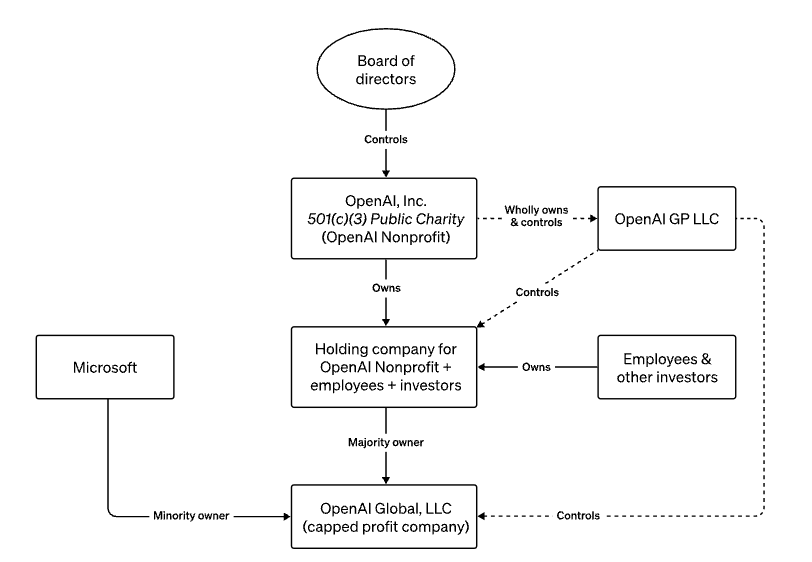OpenAI's Shift Away From For-Profit Board Governance

Table of Contents
The Rationale Behind OpenAI's Change
OpenAI's decision to restructure its governance reflects a growing awareness of the challenges inherent in developing and deploying powerful AI technologies. This move signifies a prioritization of responsible AI development over unchecked profit maximization.
Addressing Ethical Concerns
OpenAI's shift signals a proactive approach to mitigating the ethical risks associated with advanced AI. This includes:
- Increased focus on mitigating risks: The organization can now dedicate more resources to research and development focused on safety and security protocols for AI systems, preventing potential misuse and harm.
- Enhanced transparency and accountability: A non-profit structure may facilitate greater transparency in research processes and more robust mechanisms for accountability in the deployment of AI technologies.
- Greater emphasis on aligning AI systems with human values: OpenAI can prioritize the development of AI that aligns with human values and societal well-being, rather than focusing solely on maximizing efficiency or performance.
Ensuring Long-Term Sustainability
A non-profit-oriented structure offers several advantages for long-term AI research and development:
- Reduced pressure for quick returns on investment: Without the pressure of quarterly earnings reports, OpenAI can pursue longer-term research projects with higher risk but potentially greater societal benefit.
- Greater flexibility to pursue high-risk, high-reward research projects: The organization gains the freedom to explore innovative and potentially disruptive AI technologies without the constraints of short-term financial targets.
- Ability to attract and retain top talent focused on mission alignment: By emphasizing its mission-driven approach, OpenAI can attract researchers and engineers who are motivated by the potential for positive societal impact, rather than solely by financial incentives.
The Implications of OpenAI's Capped-Profit Model
OpenAI's adoption of a capped-profit model is a pivotal aspect of its restructuring. This limits the financial returns for investors, incentivizing a focus on societal benefit over purely financial gain.
Impact on Investors
The capped-profit approach will likely reshape OpenAI's investor landscape:
- Attracting impact investors and philanthropic organizations: The model will attract investors who prioritize long-term societal impact over short-term profits, aligning with OpenAI's mission.
- Potentially limiting access to large-scale capital: The capped-profit structure might make it more challenging to secure large amounts of capital from traditional venture capitalists seeking high returns.
- Balancing financial sustainability with mission-driven goals: OpenAI must carefully manage its finances to ensure long-term sustainability while remaining true to its mission.
Impact on AI Development
This shift in governance could fundamentally alter the direction of AI innovation:
- Potential for slower development in certain areas: Prioritizing ethical considerations and societal benefit might lead to a slower pace of development in some areas compared to purely for-profit companies.
- Increased focus on the ethical implications of AI research: The organization can dedicate more resources to studying and addressing the ethical implications of AI, ensuring responsible development.
- Development of more responsible and beneficial AI applications: This approach should lead to AI applications that are more aligned with human values and societal needs, minimizing potential harms.
The Future of OpenAI's Governance Model
The long-term success of OpenAI's new governance structure hinges on several factors:
Challenges and Opportunities
OpenAI faces considerable challenges in navigating its new model:
- Maintaining independence from external influences: The organization must ensure its research and development remain independent from undue pressure from governments, corporations, or other external actors.
- Ensuring effective oversight and accountability: Robust oversight mechanisms are crucial to maintain transparency and prevent potential abuses of AI technology.
- Attracting and retaining top talent in a competitive market: OpenAI needs to offer competitive compensation and a compelling mission to attract and retain top AI researchers and engineers.
Setting a Precedent
OpenAI's decision could be a significant turning point for the entire AI industry:
- Potential for wider adoption of capped-profit models: Other AI companies might adopt similar governance models, promoting a more responsible approach to AI development.
- Increased focus on ethical considerations in the AI sector: OpenAI's example could spur a broader industry-wide conversation on the ethical implications of AI.
- A shift towards a more socially responsible approach to AI development: This move could initiate a shift towards a more responsible and socially conscious AI industry.
Conclusion
OpenAI's shift away from for-profit board governance represents a bold and potentially transformative move in the field of artificial intelligence. By prioritizing ethical considerations and long-term sustainability over profit maximization, OpenAI sets a compelling example for the industry. While challenges remain, the decision could pave the way for a more responsible and beneficial future for AI. Understanding OpenAI's shift away from a purely for-profit structure is crucial for anyone interested in the future of AI development and its societal impact. To stay informed about the evolving landscape of responsible AI, continue to follow the developments surrounding OpenAI's innovative governance model and the broader impact of this critical change in the AI sector.

Featured Posts
-
 71 Godini Dzheki Chan Retrospektsiya Na Karierata Mu
May 07, 2025
71 Godini Dzheki Chan Retrospektsiya Na Karierata Mu
May 07, 2025 -
 Forget The High Table A Potential Plot For John Wick 5
May 07, 2025
Forget The High Table A Potential Plot For John Wick 5
May 07, 2025 -
 Can Germanys New Chancellor Revive European Leadership
May 07, 2025
Can Germanys New Chancellor Revive European Leadership
May 07, 2025 -
 Jackie Chans Unexpectedly Strongest Role A Surprising Hit From A Less Successful Movie
May 07, 2025
Jackie Chans Unexpectedly Strongest Role A Surprising Hit From A Less Successful Movie
May 07, 2025 -
 Dallas Wings Bueckers In Wnba Action Scores 10 Points
May 07, 2025
Dallas Wings Bueckers In Wnba Action Scores 10 Points
May 07, 2025
